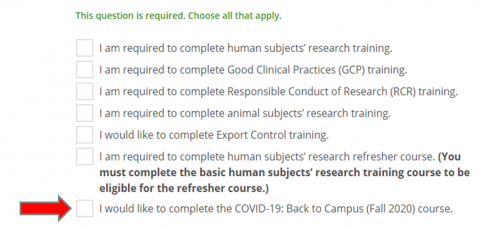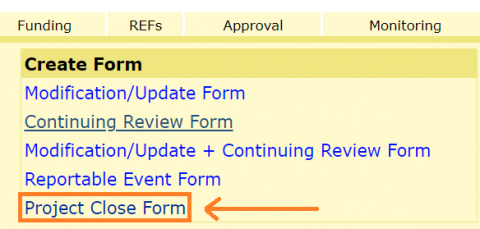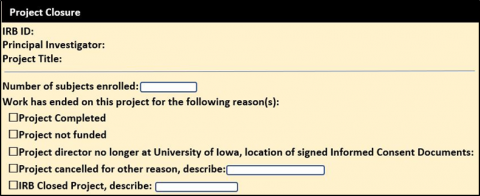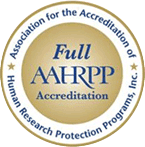Index
Science Thursday with VPR Compliance Units!
New CITI Program Course – COVID-19: Back to Campus
External and Commercial IRB Q & A: What are the Differences Between Commercial and External Single IRBs?
Herky Hints: Closing Time
IRB Advisor, June and July
In the News
Science Thursday with VPR Compliance Units!
Lisa Polakowski Schumacher, PhD
This year, COVID-19 upended many of our plans for 2020, but the VPR compliance units are undaunted by the pandemic and are back to host a fun-filled virtual Science Thursday event focused on surviving!
The VPR compliance units first teamed up back in 2017 to host a Compliance Carnival. The following years’ activities were inspired by two hit TV shows— ‘The Amazing Race’ in 2018 and ‘The Big Bang Theory’ in 2019. This year, they selected ‘Survivor: U Iowa Campus Edition’ to keep with the “having fun with science” theme.
Hosts:
- Division of Sponsored Programs
- Office of Animal Services
- Environmental Health & Safety
- Human Subjects Office
- UI Research Foundation
Activities: for every activity that you participate in, you will be entered into a drawing to receive prizes!
- Crossword puzzle (eligible for 3rd prize)
- Questions focus on promoting education about the VPR compliance units and some fun UI history!
- Questions focus on promoting education about the VPR compliance units and some fun UI history!
- BINGO (eligible for 3rd prize)
- This activity focuses on supplies needed for emergency preparedness recommended by CDC to survive COVID-19.
- Submit your Bingo card when you have demonstrated you have 3 items in a row (horizontally, vertically, & diagonally).
- Submit your Bingo card when you have demonstrated you have 3 items in a row (horizontally, vertically, & diagonally).
- This activity focuses on supplies needed for emergency preparedness recommended by CDC to survive COVID-19.
- Bling your face mask (eligible for 1st & 2nd prizes)
- Decorate a face mask of your choice and submit a photo.
- The picture can be of just the face mask, the mask being worn on the artist, or the mask gently secured on the faces of family pets!
- Decorate a face mask of your choice and submit a photo.
Information about the completing and submitting the activities can be found via this link.
All submissions for the activities are due September 10th!
Prizes:
- 1st prize = Survival Backpack (filled with CDC recommended supplies)
- 2nd prize = Portable Toilet (to minimize public rest room needs)
- 3rd prizes = Hawkeye face covering (Hawkeye gaiter for post-COVID use too)
- Multiple face coverings will be awarded for completion of the crossword puzzle & BINGO activities
Remember all submissions are due September 10th!
New CITI Program Course – COVID-19: Back to Campus
Joanie (Neyens) Hoefer, BS, CIP
The UI subscribed to a new CITI Program course called ‘COVID-19: Back to Campus (Fall 2020).’ This course is available for all UI faculty, staff and students and provides training for how to safely return to campus after extended closures due to the pandemic.
- The background of the disease and how it spreads (26 minutes),
- Methods to prevent spreading the virus (1 hour),
- Proper laboratory and research hygiene, mental health and personal well-being during the pandemic (12 minutes),
- Human subjects research (6 minutes),
- Safe animal lab reactivation (28 minutes) and
- Working with patients infected or suspected with COVID-19 (20-minute series of videos).
The course is open and available now through October 1, 2020. Taking this course is optional for UI researchers. The UI IRB does not require completion of this course and will not record completion in the Certified Investigator Database.
To access the ‘COVID-19: Back to Campus (Fall 2020)’ course, you must have a CITI Program account.
- If you do not have a CITI Program account, please follow the instructions to register on the CITI Program website.
- If you already have a CITI Program account, please follow these instructions:
- Visit www.citiprogram.org and log into your account using either your username and password or using the UI single sign on (SSO) with your HawkID and password.
- On the welcome page, click on the ‘Courses’ link.
- Under the ‘Institutional Courses’ tab, click on ‘View Courses’ for the ‘University of Iowa’.
- Scroll to the bottom and click on the ‘Add a Course’ link in the ‘Learner Tools for University of Iowa’ box.
- Select the last option, ‘I would like to complete the COVID-19: Back to Campus (Fall 2020) course.’

- Click on ‘Next’ and respond to an additional question about the course you selected.
- On the ‘Courses’ screen, scroll down to ‘Courses Ready to Begin’ and click on the title of the course.
- Once you complete the Assurance Statement, the CITI Program will allow you to start the course.
- Complete the required modules for the course and any of the optional modules that you choose.
- After completing the course, print or save a copy of the Certificate of Completion or Completion Report for your records.
If you have any questions about this course, contact an HSO CITI Program Administrator or call 319-335-6564.
External IRB Q & A: What Terminology Do I Need to Know?
By Jarrod Feld, BA
In the past, each site involved in a multi-site study obtained approval from their own Institutional Review Board (IRB). For many reasons, including recent federal policy requirements, many multi-site studies involving human subjects now operate under a single (or central) IRB of record.
External IRBs
Just as the University of Iowa can serve as the IRB of record over other sites, other institutions or entities have IRBs that may be utilized to oversee studies among multiple sites – though not all institutions have this capability. This is what is called using an ‘external’ IRB of record.
Depending on the study, and depending on whether Iowa will serve as single IRB of record or rely on another institution’s IRB, various agreements must be in place (reliance agreement, site delegation expectation, data sharing, etc.) In either case, we recommend you reach out to the Human Subjects Office if you are interested in pursuing research using a single IRB for multi-site studies.
Commercial IRBs
Commercial (for-profit) IRBs also exist to provide single IRB oversight for multi-site studies. Often, a sponsor, such as a pharmaceutical company, may choose to utilize a commercial IRB as the single/central IRB of record to oversee many sites. Unlike when relying on other institutions, commercial IRBs are not study sites, and instead only exist to provide regulatory guidance and oversight.
At Iowa, the most commonly used commercial IRBs are Western Institutional Review Board (WIRB) and Advarra, although other commercial IRBs exist and may be utilized after discussing with the Human Subjects Office. Please utilize the information on the Central and External IRB page of the Human Subjects Office website and/or contact the Human Subjects Office for further details.
Things to Consider
- It is important to note that regardless of what type of entity serves as IRB of record, it is the Principal Investigator’s and their study teams’ responsibility to understand and adhere to both the policies of the IRB of record, as well as the University’s institutional policies and state/local regulations pertaining to the study.
- Costs for reviews, modifications, continuing reviews, and other oversight can vary. Other institutions’ IRB fee structure may be more or less than UI IRB fees for sIRB model, and commercial IRB oversight is often much more expensive.
- Turnaround time varies by institution and commercial IRB. Large commercial IRBs like WIRB and Advarra have numerous boards which meet many times throughout the week, as well as dozens of dedicated staff to review, revise, and prepare submissions for review. Commercial IRB staff also have more experience working among multiples sites and coordinating communications among sites, corporate sponsors, contract research organizations, study monitors, and their boards. Institutional staff availability and ability to coordinate multi-site studies varies, as does each institution’s turnaround time.
Herky Hints: Closing Time
Lisa Polakowski Schumacher, PhD
Remember how excited you were when you finally received your IRB approval?!?! Well, closing that same study after months – or years – of hard work may not come with the same zeal. However, closing your study is an important step in the research process.Who is responsible for closing HawkIRB studies?
The Principal Investigator (PI) is responsible for all aspects of the research study, including closing the study in HawkIRB. It is also the Faculty Advisor’s obligation to make sure students know if, when, and how to close a study.
Please note: The Project Close Form is only available when the PI has an active HawkID & password because the UI IRB only oversees projects conducted by UI faculty, staff, and student researchers.
To Close or Not to Close?
There is no mechanism in the HawkIRB system to re-open a closed study, so please be sure you are ready to close the study before you submit the Project Close form.
Close a study when:
- Data collection and analysis of identified or coded data is complete
- All identifiers have been removed from study data, or
- The PI is leaving the UI and no further study activities will be conducted by UI researchers.
Do not close a study if:
- There will be interactions with subjects or data collection in the future
- The research team will continue to use or analyze identified or coded data
- The PI is leaving the UI and a new PI will take responsibility for the study
Please note: If the PI will change: 1) submit a HawkIRB Modification form to name the new PI 2) attach a new Assurance Document.
What if the PI wants to take data when they leave the UI?
UI faculty, staff, and student researchers need permission to take data with them when they leave. Study data collected at the University of Iowa, belongs to the University of Iowa. If the researcher would like to take the data to use for publications or future research at a different institution, contact the Division of Sponsored Programs (DSP) to establish a Data Use Agreement.
How do I close a study in HawkIRB?
Closing a study in HawkIRB is much easier than starting a study…there are just 2 questions!
Step 1 – Generate a Project Close Form
The link to create a Project Close form is in the box in the upper right corner of the Project Summary page. This link will generate a form in the “Drafts” section of the PI’s HawkIRB inbox.

Step 2 – Complete the Project Close Form
The IRB ID number, PI name and Project title are automatically inserted in the Project Close Form. The form requires:
- the total number of subjects enrolled
- the reason the project is being closed

Please note: The total number of subjects enrolled should not exceed the number of subjects approved by the IRB.
- The IRB considers subjects “enrolled” when subjects:
- sign an ICD
- agree to participate (ie. when IRB approved a waiver of documentation)
Record Storage Requirements
There are federal regulations and institutional policies that govern record storage (UI Investigator’s Guide Section II, Part 23). Under the IRB policy, research records include: copies of the IRB application forms, notices of IRB approval, and signed Informed Consent Documents.
Research records must be stored on the UI campus for a specific period after the study is closed in HawkIRB. The length of time depends on the type of study and which guidelines take precedence. The times listed below represent the minimum requirements.
- University of Iowa policy = 3 years
- ICD includes the HIPAA privacy statement = 6 years
- FDA regulated drug or device study = 2 years after the date a marketing application is approved
- Studies conducted at the VA Health Care System (VAHCS) = indefinitely
Feel free to call or email the Human Subjects Office if you have questions about closing a project or the IRB record storage requirements.
IRB Advisor, June and July
By Maegan Tyrrell, BA, CHES
IRB Advisor (a publication of Relias) is a monthly newsletter with articles about issues facing IRBs and individuals involved with human subjects research. Current and past issues of IRB Advisor are posted in the “IRB ICON Course for Researchers” which is accessible to anyone with an active UI HawkID. The portal to this ICON Course is on the Education and Training page of the Human Subjects Office website.
This month we are spotlighting articles from the June and July 2020 IRB Advisor Newsletters.
Research Organizations Face Challenges New and Old (June 2020 IRB Advisor)
Research organizations have been adaptable and resilient this year as they face many new challenges. As research resumes, experts in human subjects protections remind IRBs and researchers to keep regulatory and safety practices in mind. If study visits must be done in person, one tactic is to call all subjects the day before a visit to ask about symptoms or illness. Research organizations should also assess each new aspect of conducting clinical trials during COVID-19, particularly methodology and procedures for remote study activities. Researchers may have been hesitant to try new strategies in research, but the pandemic has helped the research community gain confidence in exploring alternatives to in-person study visits. Experts give these key points for focusing on the next phase of conducting research during the pandemic:
- Reassure and retain staff
- Become more involved in decisions about study design and study execution
- Recognize the increased financial and time burdens – even when there are fewer study visits
New FDA Guidance Explains COVID-19 Expanded Access Policy (July 2020 IRB Advisor)
The Food and Drug Administration (FDA) issued guidance in June for IRBs dealing with requests for expanded access to investigational products. This guidance, which is not unique to COVID-19, reinforces guidelines already put in place for individual patient expanded access to unapproved drugs for any condition. Expanded access may apply when there is a drug that showed promise, but never made it through an actual study process. Patients sometimes want to try the drug out if it is still available instead of waiting for another clinical trial. IRBs get involved to make sure informed consent is still obtained even though expanded access is not research. This FDA guidance includes three categories of expanded access investigational new drug applications:
- Individual patient INDs
- Intermediate size INDs for somewhat larger groups
- Treatment INDs for larger groups
Other articles in the June issue include:
- IRB Experts Offer Advice for Changing Research Landscape
- Q&A Part 1: IRBs Face Their Toughest Challenges with COVID-19
- Q&A Part 2: How IRB Leaders Helped Staff, Board Members Cope with Uncertainty
- Q&A Part 3: IRBs Learn Positive and Instructional Lessons from Pandemic
Other articles in the July issue include:
- Vaccine Challenge Trials Present Ethical Issues to IRBs, HRPPs
- Actions for IRBs Reviewing Vaccine Challenge Trials
- Small IRB Copes with COVID-19 Pandemic Under Limited Budget
- IRB Highlights Standardized and Effective Metrics Model
- Enhance Health Literacy Among Study Participants
- Biometrics Expert Discusses Data Integrity for COVID-19 Clinical Trials
In the News
- Researchers find abstract art evokes a more abstract mindset than representational art Medical Xpress
- Novel diabetes drug candidate discovered by UAB, Southern Research shows promise in tests of humans and mice Alabama Newscenter
- Consumption of a blueberry enriched diet by women for six weeks alters determinants of human muscle progenitor cell function EurekAlert!
- Lockdown study reports surge in health anxieties Newswise





